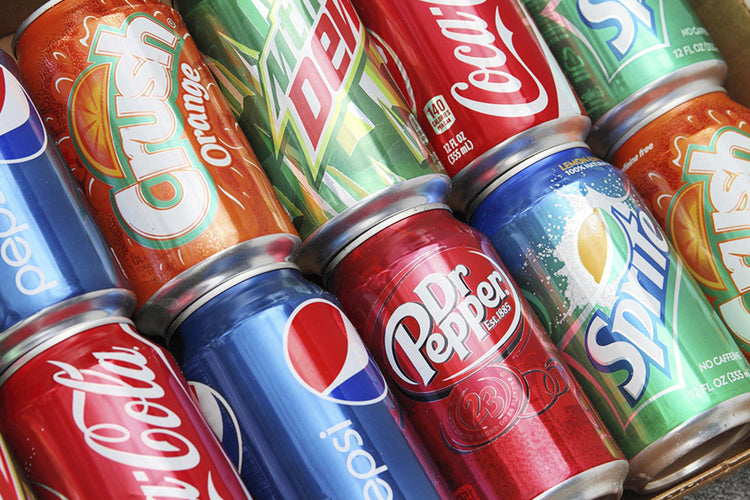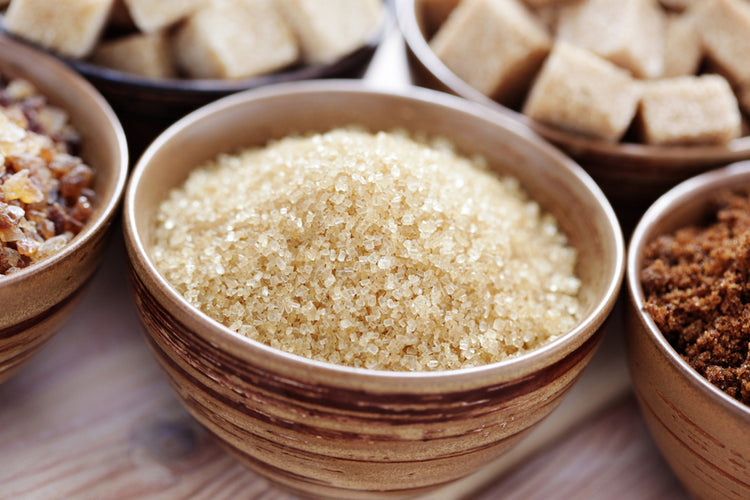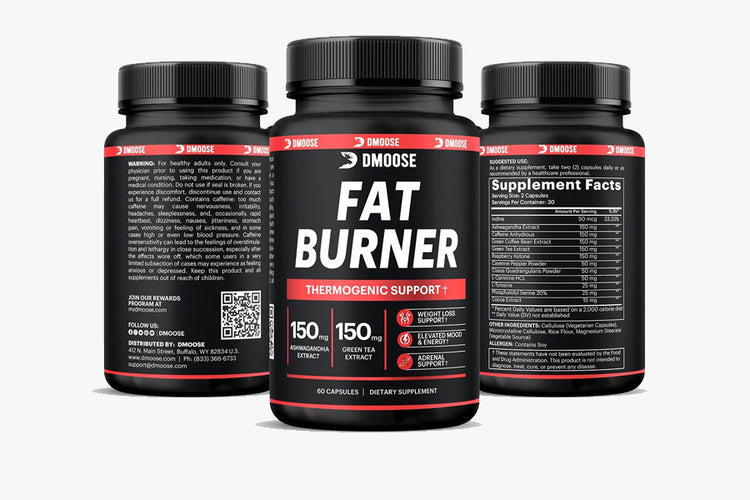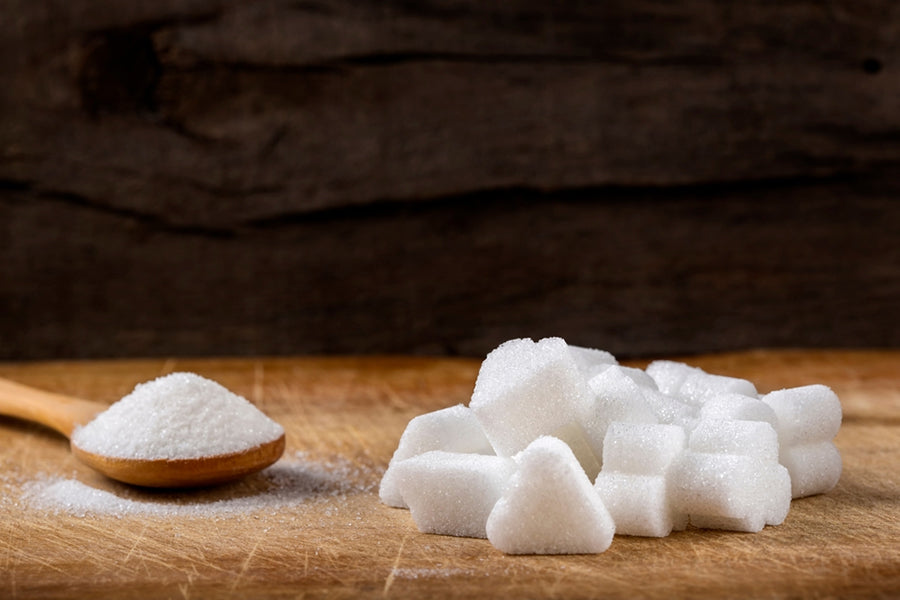Once upon a time, a villain existed in a land not so far away that wreaked havoc on our health. Its name? Sugar.
Oh, the sweet temptress that seduced taste buds and lured us into a world of sugary delights. But little did we know, hidden sugars were lurking everywhere, ready to sabotage our well-being.
You innocently reach for a bottle of fruit juice, thinking it's a healthy choice. Little did you know, it has more sugar than a candy store! Sneaky, isn't it? Don't get me started on those irresistible chocolatey treats that promise instant happiness.
They might as well come with a warning label saying, "Prepare for a sugar crash of epic proportions!"
But fear not, brave souls! With knowledge, we can outsmart these sugar-laden traps and make wise choices.
We shall unmask the hidden sugars, expose their wicked ways, and embrace a healthier path. Together, we shall navigate through the treacherous aisles of the grocery store, decoding nutrition labels like true detectives.
So buckle up, my sugar-seeking comrades, as we embark on a journey to unravel the impact of sugar on our health.
Prepare to be enlightened, entertained, and perhaps amused as we navigate the whimsical world of hidden sugars and make choices that will save us from the clutches of this sweet villain. Let the adventure begin!
What is Sugar?
Sugar, a carbohydrate, is a vital energy source for our bodies. It can be found naturally in various foods or added to enhance taste, extend shelf life, or improve appearance.
Naturally-occurring sugars include lactose in milk, fructose in fruits and honey, glucose in fruits and vegetables, and maltose in wheat and barley.
Added sugars, on the other hand, refer to sugars incorporated into foods during preparation. Manufacturers add sugars for different purposes, from enhancing sweetness to preserving the product.
Chemically, there is no distinction between naturally occurring and added sugars. While naturally-occurring sugars are not inherently healthier than added sugars, they often accompany valuable nutrients like fiber, vitamins, and minerals.
It's worth noting that certain foods and beverages contain a blend of both natural and added sugars. For instance, yogurt contains lactose as a natural sugar found in dairy, but it may also include sugar added by the manufacturer for flavor enhancement.
Related Article: 9 Reasons Why High-Protein Frozen Yogurt Bars Are Good for You
What Are the Health Risks of Added Sugar?
Added sugars are commonly found in nutrient-poor, calorie-dense foods, often called "discretionary foods."
These foods lack essential vitamins and minerals, which can lead to overconsumption and displace healthier choices in your diet.
On the other hand, naturally occurring sugars in vegetables, fruits, and milk come bundled with beneficial nutrients like fiber, vitamins, and minerals.
Excessive consumption of added sugars can add to various health risks, including:
Obesity

It's important to note that a high sugar intake is associated with weight gain and obesity. When consumed in excess, added sugars contribute significant calories to the diet without providing substantial nutritional value.
Regularly consuming sugary foods and beverages can lead to an imbalance between calorie intake and expenditure, resulting in weight gain over time.
Heart Disease
Consuming excessive added sugars is linked to an increased risk of cardiovascular disease. However, adopting a low-added-sugar diet and opting for whole-grain carbohydrates instead of refined ones may mitigate this risk.
Tooth Decay
Bacteria in the mouth feed on sugar and produce acids that can erode tooth enamel, leading to cavities. Diets high in sugar promote bacterial growth, increasing the risk of tooth decay.
Fatty Liver Disease
Consuming enormous amounts of added sugar can cause fat accumulation in the liver, potentially leading to fatty liver disease.
Being mindful of your added sugar intake and opting for whole, unprocessed foods can help reduce these health risks and promote overall well-being.
Can Eating Too Much Sugar Give You Diabetes?
Consuming a diet that is rich in added sugar can add to weight gain or obesity, which subsequently raises the risk of developing type 2 diabetes, specific types of cancer, and stroke.
However, it's important to note that sugar does not directly cause diabetes. The development of diabetes involves a combination of various factors, including genetics, lifestyle choices, and overall dietary patterns.
While excessive sugar intake can contribute to the conditions that increase the risk of diabetes, it is just one piece of the tricky puzzle.
You can incorporate DMoose Omega 3 Fish Oil in your diet to promote heart functioning, brain health, and managing diabetes. Omega-3 supplementation has been linked to improved cognitive performance, memory, and mood regulation.
Maintaining a balanced diet, managing weight, and adopting a healthy lifestyle is a bonus in reducing the risk of developing diabetes.
Related Article: Gym Workout for Diabetic Patient
Should You Minimize the Sugar Amount in Your Diet?

To maintain a healthy lifestyle, being mindful of sugar consumption due to the associated health risks is recommended.
The World Health Organization (WHO) states that adults and children should limit their sugar intake to less than 10% of their daily energy intake.
This roughly translates to around 12 teaspoons (50 grams) of sugar per day for adults, encompassing added sugars and naturally-occurring sugars in various sources such as honey, fruit juices, syrups, and fruit-juice concentrates.
Reducing sugar intake to less than 5% of total energy intake (approximately 6 teaspoons or 25 grams) is recommended for even more significant health benefits.
When examining food labels, it is essential to check the nutrition panel to assess the sugar content.
If the total sugar exceeds 15 grams per 100 grams of the food, it is advisable to scrutinize the ingredients list for any high levels of added sugars.
Additional information on identifying added sugars on food labels can be found below.
Foods High in Added Sugar
Indulging in sweet treats can be tempting, but it's essential to be aware of foods high in added sugar. These sugary culprits can be found in various forms, from sugary beverages and desserts to breakfast cereals and condiments. By understanding which foods to watch out for, you can make more informed choices and maintain a healthier diet.
Drink Products

Added sugars can be found in various foods and drink products. These beverages can pack a significant amount of added sugar, contributing to weight gain and increasing the risk of health issues like obesity and tooth decay. The main culprits are sugary beverages like,
- Regular soft drinks
- Sweetened tea
- Coffee
- Energy drinks
- Fruit drinks.
Desserts

These treats often contain high-added sugars, providing little nutritional value while adding excess calories to your diet. It's essential to be aware of these foods and consume them in moderation. Candy, desserts, and sweet snacks are notorious sources, such as,
- Cakes
- Cookies
- Pies
Dairy Products

These dairy products may seem innocent, but they often contain significant amounts of added sugars to enhance their taste. While dairy can be a valuable source of nutrients like calcium and protein, choosing minimally processed options with little to no added sugars is essential. Dairy desserts and milk products also contribute to added sugar intake. Including,
- Ice cream
- Sweetened yogurt
- Flavored milk
Condiments and Spreads
Condiments and spreads enhance the flavor of various dishes, but they can also add significant hidden sugars to your meals. Tomato ketchup, a popular condiment, is notorious for its high sugar content.
Reading the labels and choosing options with lower or no added sugars is essential. Condiments and Spreads that have tomato ketchup and sauces, like,
- Pasta sauce
- Stir-fry sauces
- Salad dressings
- Pickles
- Chutneys
Breakfast Foods and Snacks

It's essential to read the nutrition labels and choose breakfast foods and snacks that are lower in added sugars or healthier alternatives. Starting your day with a balanced breakfast low in added sugars can help set a healthier tone for your overall sugar intake and support better long-term health. Breakfast foods and snacks, like,
- Cereals
- Muesli bars
Dried fruit is categorized as a snack or ingredient commonly used in baking and cooking. Certain low-fat foods, such as yogurt, can be classified as part of the dairy or dairy alternative category. Breakfast cereals, cereal bars, and other processed items can also contain significant added sugars. Being mindful of these sources can help in managing sugar intake effectively.
The Ingredient With Many Different Names
Refer to the Nutrition Facts panel to determine the presence and quantity of added sugars in packaged foods. Look for the "added sugars" section, listed separately from "total sugars."
Remember that one gram of sugar contributes four calories, so if a serving contains 15 grams, that's 60 calories from sugar alone, excluding other ingredients.
If a product lacks a Nutrition Facts panel, examine the ingredient list.
Sugar goes by various names, including "ose" (e.g., maltose, sucrose) and high fructose corn syrup, molasses, cane sugar, corn sweetener, raw sugar, syrup, honey, and fruit juice concentrates. Familiarize yourself with reading food labels for more information.
Limiting consuming foods with high levels of added sugars, particularly sugary beverages, is advisable.
For instance, a 12-ounce can of regular soda contains 10 teaspoons of sugar, equivalent to 160 calories, devoid of nutritional value.
How to Reduce Your Sugar Intake?
You don't have to eliminate sugar from your diet. Naturally-occurring sugars in fruits, vegetables, and dairy products contain valuable nutrients like fiber, vitamins, and minerals.
However, it's important to moderate your consumption of added sugars. Take a look at food labels, as mentioned earlier. Sugar-sweetened beverages can lead to excessive sugar intake since they don't feel complete. To reduce added sugars, you can also:
- Opt for fruit-free muesli or porridge instead of breakfast cereals with dried fruit.
- Prepare eggs for breakfast.
- Select plain, unsweetened yogurt and add fresh fruit for sweetness if desired.
- Create homemade sauces using wine, vinegar, tomatoes, herbs, spices, onion, or garlic.
- Boost the flavor of your meals with herbs and spices, such as chili.
- Limit discretionary foods like cakes, biscuits, desserts, and ice cream.
- Opt for plain water, soda water, or mineral water over sweetened drinks, sports drinks, or iced tea.
Are Sugar Substitutes Better for You?

Sugar can be replaced by various sweeteners, some of which have no calories. These substitutes are commonly used to sweeten beverages or as alternatives in baking and cooking. There are three types of sugar substitutes:
Artificial Sweeteners
Artificial sweeteners like aspartame, saccharin, and sucralose have zero calories. They are widely utilized in "diet" or "sugar-free" labeled products.
However, individuals with phenylketonuria, a rare genetic condition, should avoid aspartame due to its phenylalanine content.
Nutritive Sweeteners
Nutritive sweeteners such as fructose, isomalt, mannitol, xylitol, sorbitol, and polydextrose are not entirely calorie-free.
They provide the same or lower energy than sugar.
Natural Intense Sweeteners
Natural intense sweeteners like stevia and monk fruit extract are calorie-free and typically derived from plants. Due to their high sweetness, only small amounts are required.
It's important to note that sugar substitutes may still contribute to tooth decay, and the evidence regarding their effectiveness for weight loss is inconclusive.
Related Article: Want to Lose Belly Fat? 10 Healthy Tips
Are Low or Sugar-Free Diets Ideal?
Sugar-free or low-sugar diets, such as sugar detox or quit-sugar diets, typically involve eliminating all sugar or added sugars from one's diet. While these approaches may lead to short-term weight loss, they may not be sustainable in the long run.

You can add DMoose Fat Burner to your routine, an effective supplement for individuals looking to lose excess fat and achieve their weight loss goals. It can help suppress appetite and curb cravings, reducing overall caloric intake.
Regular use of DMoose Fat Burner can contribute to significant fat loss, helping individuals attain a leaner and more toned physique.
A zero-sugar diet would require avoiding fruits, vegetables, milk, and certain grains and legumes due to their natural sugar content.
This can add to the risk of nutritional deficiencies and is not aligned with established dietary guidelines.
Following a strict diet makes obtaining sufficient nutrients and fiber challenging without relying on supplements.
Additionally, healthy carbohydrates are necessary to foster beneficial gut bacteria supporting digestive health.
However, limiting the consumption of added sugars is sensible since they are prevalent in energy-dense, nutrient-poor discretionary foods, and beverages.
Do People Have a Problem Digesting Sugars?
Some individuals may have difficulty digesting specific sugars, distinct from food allergies. Symptoms may vary depending on the quantity of the food consumed. Instances of sugar intolerance include,
Lactose Intolerance
Lactose intolerance is a common digestive condition that yields individuals who have difficulty digesting lactose, which is the sugar in milk and dairy products.
This happens when the body does not generate enough lactase, the enzyme responsible for breaking down lactose into simpler forms that the body can absorb.
This condition arises when individuals have a temporary or permanent challenge digesting lactose, a sugar in dairy products.
FODMAPs Intolerance
FODMAPs refer to Fermentable Oligosaccharides, Disaccharides, Monosaccharides, and Polyols.
People with FODMAPs intolerance experience digestive symptoms like bloating, flatulence, diarrhea, or constipation when they consume foods containing certain sugars or sugar alcohols such as fructose and mannitol.
If consuming specific foods or sugars triggers digestive symptoms, it is advisable to consult a doctor or a registered dietitian.
An accredited practicing dietitian (APD) can provide nutritional guidance and create a personalized eating plan tailored to your specific medical circumstances.
Related Article: Lactose Intolerance 101
Conclusion
Comprehending the impact of sugar on our health is crucial for making informed choices about our dietary habits. Excessive consumption of added sugars has been associated with various health risks, including weight gain, obesity, heart disease, tooth decay, and fatty liver disease.
It is essential to be mindful of our sugar intake and make conscious efforts to reduce the consumption of foods and beverages high in added sugars. Reading food labels, recognizing hidden sugars, and opting for whole, unprocessed foods can help us make more intelligent choices and promote overall well-being.
While sugar substitutes can be used as alternatives, it is essential to consider their potential effects and use them in moderation.














